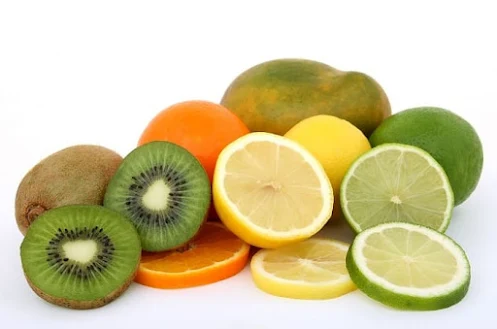Health Benefits Of Citrus Fruits That You Probably Didn't Know - Dr Appiah
What Are Citrus Fruits?
Citrus fruits are fruits produced by trees and
shrubs belonging to the Rutaceae genus
of plants. They include oranges,
grapefruits, lemons, and lime. They have a high citric acid content and are typically round or elongated with
a juicy, fleshy pulp surrounding their seeds.
What
Nutrients Do Citrus Fruits Contain?
ORANGE GRAPEFRUIT TANGERINE
Weight (g) 131 236 84
Energy (kcal) 62 78 37
Fiber content (g)3.1 2.5 1.7
Ascorbic acid (mg )70 79 26
Folate (mg) 40 24 17
Potassium (mg)237 350 132
The simple carbohydrates found in citrus fruits are glucose, sucrose, and fructose. The
dietary fiber found in citrus fruits containspectin that binds with
cholesterol and helps flush it out of the body.
The one nutrient that citrus fruits are most famous
for providing is vitamin C (ascorbic
acid). In fact, a medium orange manages to give you 130% of the daily requirement of this amazing nutrient. Other
important nutrients provided by citrus fruits include folate, lycopene, potassium, vitamin B6, magnesium, niacin, thiamin,
and phytonutrients.
Benefits
1.
They
protect against cancer
A study conducted at Harvard found that citrus
fruits contain components like flavonoids, folate, carotenoids, and vitamin C
that significantly reduce the risk of esophageal cancer.Vitamin C and a specific flavonoid (nobiletin) found in citrus
fruits are also supposed to be antiangiogenic.This
means that they prevent the formation of new blood vessels that help in
spreading the cancer to other areas of the body.
The risk of developing epithelial ovarian cancer was
also found to be significantly lower in women who consumed citrus fruits, owing
to the flavonones found in them.According to the American Cancer Society,
citrus fruits are especially helpful in lowering the risk of stomach cancer.
2.
Boost
Immunity
Besides the vitamin C and vitamin B6 that they are
most famous for, citrus fruits also contain many plant compounds such as
flavonoids, carotenoids, and essential oils that are responsible for a majority
of the health benefits associated with them.The vitamin C found in citrus
fruits is especially important as it is not only anti-inflammatory, antiviral,
and antibacterial, but it also works to boost your immune system. (Read also: Effects Of Food On Your Immune System)
3.
Great
Sources Of Soluble Fiber
Citrus fruits are great sources of not just dietary
fiber but soluble dietary fiber, which has many health benefits. This soluble
dietary fiber has been found to be responsible for lower lipid levels and blood
pressure, weight loss, improved blood glucose control, reduced inflammation,
and improved immune function.
4.
Reduce
The Risk Of Kidney Stone Formation
Kidney stones form when
the citrate levels in your urine drop. Drinking a few glasses of fresh lemonade
throughout the day has been found to increase urinary citrate levels and reduce
the risk of kidney stone formation.
5.
Protect
The Health Of Your Heart
Citrus fruits contain phytomicronutrients like carotenoids
and polyphenols. The frequent intake of these nutrients boosts heart health
and protects against cardiovascular diseases.
6.
Protect
Your Brain
After just an eight-week trial, which involved
making healthy older adults drink flavanone-rich orange juice, the component
was found to have a significant positive effect on their cognitive function
(29). This just goes to show that regular consumption of this marvelous fruit
has the potential to protect our brain from neurodegenerative diseases.
ALSO: Health Benefits Of Lemon
7.
Have
Low Glycemic Index
“The glycemic
index (or GI) is a ranking of carbohydrates on a scale from 0 to 100 according
to the extent to which they raise blood sugar (glucose) levels after eating.
Foods with a high GI are those which are rapidly digested, absorbed and
metabolised and result in marked fluctuations in blood sugar (glucose) levels.
Low GI carbohydrates – the ones that produce smaller fluctuations in your blood
glucose and insulin levels – is one of the secrets to long-term health,
reducing your risk of type 2 diabetes and heart disease’’
Citrus
fruits have a low glycemic index that has been found to reduce the monthly
average blood sugar levels, blood pressure, and coronary heart disease risk in
type 2 diabetes patients.
8.
Packed
With Potassium
Citrus fruits are packed with the electrolyte
potassium. The intake of potassium through citrus has been found to reduce
blood pressure and the risk of stroke and coronary heart disease in adults. It
also reduces the effects of age-related bone loss, renal disease, and kidney
stones. This potassium is also needed by our body to break down carbohydrates,
build muscle, and maintain the regular electrical activity of the heart.
9. Maintain The Health Of Your Eyes
We already know that citrus fruits are rich in
vitamin C. But it’s interesting to note that this vitamin not only helps maintain the health of the blood
vessels in youreyes, but it is also essential to reduce the risk of
developing cataracts and age-related macular degeneration.
The Downside of Citrus Fruits
High
Amounts Could Cause Cavities
Eating lots of citrus fruits or juices could
increase the risk of cavities. That's because the acid in citrus fruits erodes
tooth enamel.
This
is a particular risk if you sip on lemon water all day long, bathing your teeth
in acid.Interestingly, certain compounds in citrus peels may
combat the bacteria that cause dental cavities.
Digestive
Problems
Some citrus fruits, like oranges, have high fiber
content that can cause digestive problems like abdominal cramps and diarrhea.
Biphenyl
Toxicity
To prevent fungi growth, citrus fruits are often
sprayed with biphenyl when being packaged. When consumed in acute quantities,
this chemical can cause skin and eye irritation. It can also have toxic effects
on your kidneys, liver, and central nervous system.
Heartburn
People who regularly suffer from heartburn or have
been diagnosed with gastroesophageal reflux disease (GERD) (also called acid
reflux disease), are better off steering clear of citrus fruits as they have
high acid content that can aggravate these problems.
Drug
Interaction
There are certain enzymes that are released by your
body that help in breaking down medication. Citrus fruits contain some
chemicals that could inhibit the release of these enzymes, thus allowing high
levels of these medication to stay in your system and potentially exacerbating
their side effects.
Citrus fruits are high in potassium. Anyone taking beta-blockers (that also work to increase
the potassium levels in your body) should avoid citrus fruits because, in
combination with this medication, they can sky-rocket the potassium levels in
your body that cannot be easily brought down by their weakened kidneys.
Some citrus fruits, like grapefruit, can interact
dangerously with certain medications like antibiotics,
cardiovascular drugs, blood pressure medication, organ transplant rejection
drugs, and cholesterol lowering drugs. This can lead to kidney failure, respiratory failure, gastrointestinal bleeding, and
other such major complications. So, make sure you speak to your doctor
about which citrus fruits you can safely consume.
1. The
best time to consume these fruits is in the morning on an empty stomach or
after a light meal.
2. Avoid
drinking water after consuming citrus fruits as it might increase acidity in
your stomach.
3. Do
not preserve citric fruits for a long time since the nutritional value reduces
with extended shelf life. Opt for fresh fruits in your daily diet.
4. Try
eating the fruit along with its mesocarp (the white skin covering the
individual segments) to gain the benefits of its fibrous content, which reduces
constipation.
5. Never include these fruits along with your meal because they could cause acidity and hinder digestion. You could have them a couple of hours before or after a meal.











